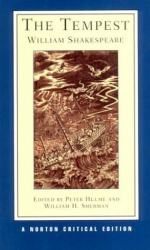|
|
The Tempest Author/Context
William Shakespeare was born on the 23rd of April 1564. As the son of an alderman, he was educated in the schools of the literate upper middle class. At eighteen he was hastily married to Anne Hathaway. Within the next seven years he left his home region of Stratford and joined a company of players in London called the Queen's Men. Around 1592, his first play Henry VI was produced. Shakespeare earned critical and financial acclaim in his lifetime only to die at age 52 in April 1616.
Shakespeare's plays were an essential part of an 'English renaissance' known better as the Elizabethan period. The reign of the 'virgin' queen saw the resurgence of art in England as well as the proliferation of translations of the classics: Virgil, Cicero, Homer, Plutarch and Horace, to name a few. The writings of Spenser and Chaucer were enjoying great acclaim and wide readership during this period, as the English theater began to evolve. A group of revolutionary dramatists appeared in Shakespeare's youth, clearing the way for the emergence of Shakespeare and his contemporary, Christopher Marlowe.
Simultaneously with the development of dramatic literature was the evolution of the theater and its actors. Acting troupes grew in size and numbers as theaters themselves became more permanent structures as opposed to clearings and squares at fairgrounds. Theater was popular entertainment: a melange of drama, poetry and county fair. In 1599, Shakespeare's new troupe, Chamberlain's men (cap this?), built the Globe theater.
Shakespeare was not only a playwright, however. His sonnets are read in schools to this day. So famous and influential were these poems, that his rhyming pattern has become codified in the English poetic tradition as the Shakespearean sonnet.
The Tempest, one of his later plays, was produced in 1611. It is one of his last compositions, and many critics feel it differs significantly from many of his other works. This play incorporates themes of the newly discovered Americas and the difficulties inherent in colonization. It is also considered to be very personal. Edward Dutton says that there is a "theory that Prospero in The Tempest represents Shakespeare himself," (Dutton, 152). Although he counters this theory, this indicates how seriously many scholars take this play. In addition, Stanley Wells says that "The Tempest resists clear-cut allegorical readings; this is a measure of its success. It is a supremely poetic drama, not just because it includes some of Shakespeare's greatest poetry but because it speaks, as the greatest poetry does, on many levels, universally relevant and¾if we can hear Ariel's music¾universally effective."(Wells, 74).
Shakespeare's influence is also practically universal. To this day his plays are staged around the world. They provide inspiration and subject matter for movies. Modern authors still quote him. Aldous Huxley titled his book from Miranda's famous quote in Act 5. Shakespeare persists as a poet and playwright who is immensely quotable and irrefutably universal. In the paraphrased words of Samuel Taylor Coleridge: "None of the plays of Shakespeare were built upon anything but what was absolutely necessary for our existence, and consequently must be permanent while we continue [to be] men" (Foakes, 87).
Bibliography
Dutton, Richard. William Shakespeare: A Literary Life. New York: St. Martin's Press, 1989.
Foakes, R.A. Coleridge on Shakespeare: The text of the Lectures of 1811-1812. Great Britain: The University Press of Virginia, 1971.
Lamborn, E.A.G. Shakespeare: The Man and his Stage. New York: Haskell House Publishers, 1977.
Shakespeare, William. The Sonnets and Narrative Poems. Sylvan Barnet ed. New York: Penguin Books, 1989.
Shakespeare, William. The Tempest. Stephen Orgel, ed. Oxford: Oxford University Press, 1987.
Wells, Stanley. Shakespeare: The Writer and His Work. New York: Charles Scribner's Sons, 1978.




